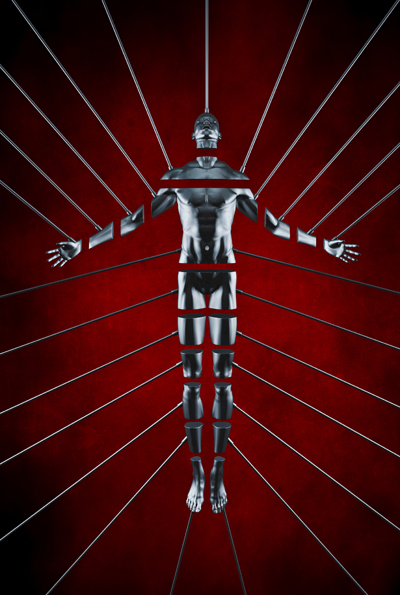
|
If you read science fiction, the Empire is always evil, the Emperor is always a villain, and his officers and minions—we’re looking at you, Darth—are always either toadies or supervillains. It was so in the Star Wars movies and the Dune books. Generically, if there is an empire involved in the story, it is bad place and meant to be fought against by the forces of light, reason, and goodness.
Perhaps this is a cultural spillover from the political view—generally held by Marxists and Soviet-inspired Leftists—that all the troubles of the modern world stem from “imperialism.” And by that they usually mean the empires built by white Europeans in Africa, the Middle East, Asia, and South America. The equation is: “Empire bad, local governance good”—even when local governance is at the tribal level without any political refinement. And that equation holds right up until the empire in question is one managed by Soviets or Chinese Communists, and then the benefits of central control by a foreign power structure are not to be questioned.
The cultural spillover also derives from the depiction of Rome and its ancient Mediterranean empire from the Judeo-Christian viewpoint. That is, from the troubles the Romans faced in the province of Judea, particularly when Rome tried to impose its statist, polytheistic religion on people who only believed in one, true god. This dispute ended with the Siege of Jerusalem in 70 A.D. and the Jewish Diaspora. That jaundiced view of the Roman Empire was also fed to us by the persecution of Christ under Pilate and of Christians in general under the empire—until Constantine legalized their religion three hundred years later.
But was Rome an evil empire? Was life there such a hardship?
First, let’s count the negatives. For starters, most people outside the City of Rome itself were added to the empire through conquest. You started off by trading with Rome at a distance, then getting a road built into your territory, then seeing an army march in along that road, and then you had to fight for the right of self-determination. Sometimes the army came first and the road came second—to make it easier for Rome to send reinforcements and hold you down. Almost nobody welcomed Rome at first. But let’s be fair: when the Romans marched in, what they were fighting was mostly the local king, the ancient families who held positions of power, and the armies they could recruit and command. Whether the war was short—as in a few campaigns by Caesar among the Transalpine Gauls—or long—as in all that unhappiness in Judea ending in the reduction of the capital and a bloodbath—was usually a matter of whether and how involved the average person, the peasant in the fields, became in the struggle. That, and the cohesive nature of the civilization that the Romans were attempting to absorb. Gallic and German tribesman were culturally similar but independence-minded and locally divided, and by the standards of the day they were primitive. Judea was an advanced civilization with a unified culture, strong central government, and firm beliefs.1
Next, the issue of slavery. Rome had it and didn’t apologize for that. But then, so did most of the lands and kingdoms they conquered. But, unlike the South in the United States, Roman slavery was not race-based. Just because you had a certain heritage and skin of a certain color did not make you a slave, subject to harassment and capture even after you were freed. Roman slaves entered captivity by losing a battle—all those wars of conquest—or resisting so strongly that the Romans made an example of your whole family or town by selling them into slavery. Or you could become a slave after being found guilty of a crime or through indebtedness—having pledged your person as collateral for a loan. Still, a Roman slave was property and could be abused, sexually exploited, tortured, and even summarily executed—although it generally didn’t profit an owner to damage or destroy his or her property. But also, Roman slaves could earn their freedom, and Rome eventually legislated slave protections such as being able to lodge complaints against their masters and to receive medical care in sickness and old age. And finally, in the ancient world, as in much of the world today, unless you held a piece of property or were trained and engaged in a skill or trade, you always had someone standing over you and making demands on your labor, your time, and ultimately your life. Still, it was better to be a citizen of Rome than anyone’s slave.2
And then, there was tribute. As a Roman province, you were put under the administration of a governor known as a propraetor or proconsul—usually an ex-consul or senior government official out to make his fortune after years of public service. The Roman administration was there mostly to collect tribute—so much to be paid each year in gold or trade goods—or to secure some necessity that the City of Rome needed, such as grain from Egypt, which was the ancient world’s breadbasket. Along with the governor and his administration came the tax collectors, who were not always honest and not always working directly for Rome. It was hard being someone from an old family, landed, wealthy, or otherwise locally important in a newly established Roman province. But, as noted above, life was hard all over—still is in many ways.
And now, some of the good things. First, you were generally cleaner and safer inside the Roman Empire than out of it. The Romans were creative and compulsive engineers, and wherever they went they took with them their construction skills and their preference for clean water and a relaxing bath. They built huge aqueducts not just to serve the City of Rome but throughout the empire to provide clean water and introduce the concept of regular bathing to the general population. And you tended to be safer because the Roman administration frowned upon casual banditry—an occupation reserved to the state—and introduced a proven code of laws suitable to civilized urban living.
Next, your worldview and access to trade expanded. The Romans transmitted knowledge and trade goods from one end of the Mediterranean basin to the other and extending into the hinterlands. If you were part of the empire, you were a citizen of the world. That meant, for a person with ambition, an increase in opportunity and income. And for a citizen, either in the city or the countryside, who might not have owned a piece of property or engaged in a lucrative trade, there was always the army. You signed up for 25 years of service with the legion. After that time, if you survived, you were generally awarded land and a living in the province where you had fought or maintained order—and by then you usually had a local wife and children. Being a Roman soldier was more dangerous than being, say, a farmer out in the hinterlands—except for that casual banditry—but it wasn’t a death sentence, either. The Roman legions fought with a disciplined cohesiveness and regular tactics that tended to minimize wounding and death and favored applying massive and concentrated force against their enemies. It was good to be on the winning side.
And finally, if you were a good ally and willing supporter of Rome, you eventually became a Roman citizen yourself. You had to bathe, speak and read Latin, and obey the law, of course. No hot-headed rebellion—which anyway would be quickly crushed, at least in the times that the Republic and then the Empire were a going concern. Eventually, you could move to Rome itself and become part of the elite. And the consensus seems to be that, in the ancient world, the best time to be alive was Rome in the second century—that is, between 100 and 200 A.D. Not only was the weather mild—the “Roman Warm Period”—but the Mediterranean world was generally at peace. It was a lull between the political chaos of the Hellenistic Age and the rising cold and invading barbarians of the encroaching Dark Age.
There is a reason people submit to the rule of empires and emperors. Whether the Islamic Caliphate, the Mongol Empire, the Ottoman Turks, or the British Empire, the food is usually better, the arts and sciences richer, the trade more expansive, the rule of law generally gentler and less oppressive than the dictates of a local king or brigand, and the average person has a sense of being part of something really grand. Also, under the Romans, you got a hot bath, and under the British, a flush toilet. Not bad for minding your own business and occasionally tugging the forelock.
1. And Egypt was just a mess, having been conquered by Alexander three centuries earlier and then mismanaged by the Ptolemies.
2. The taint of slavery did linger, however, even after a person was set free through the process of manumission. “Freedman” was a separate class in Rome from “citizen,” although freedmen who had previously been owned by Roman citizens could vote and their children became citizens. Still, in the Republic it was rumored that the general and statesman Gaius Marius, one of the “New Men” whose family originated in the allied Italian states and not in the City of Rome itself, had slaves in his ancestry. This was considered a blot on his character.


